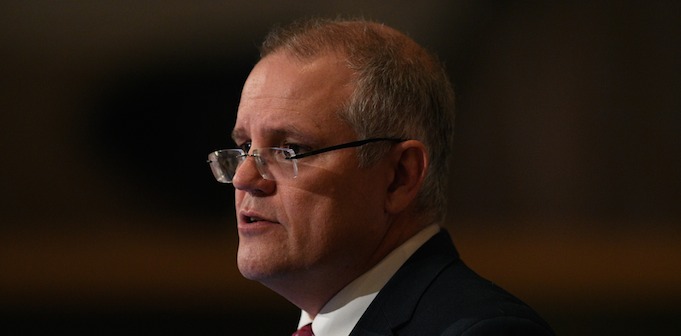
Prime Minister Scott Morrison. Source: APP/Dan Himbrechts.
It’s been a tumultuous year for Australia in a general and businesses haven’t been immune to the fallout from some of the country’s biggest scandals in recent memory.
There’s the banking royal commission, the revelations from which have prompted horror from small business advocates and resulted in a credit crackdown that’s curtailing investment.
The near constant political uncertainty generated from a string of by-elections and a leadership spill hasn’t done much good for confidence either.
Here are five ways businesses got screwed over in 2018.
1. Websites confiscated
Last month SmartCompany reported the stories of three business owners who had their website domains taken in an apparent haphazard crackdown on prohibited terms by Australia’s domain space regulator au Domain Administration (auDA).
We spoke to digital marketer Craig Lennard who purchased the australia.net.au domain in 1996, only to be told out of the blue he was unable to renew his website over 20 years later.
“I spent three weeks having to change my entire life with new email addresses everywhere … I’ve lost credibility in the business marketplace with the things I’ve been doing,” Lennard said of the debacle.

auDa published a warning to domain holders in major newspapers in February.
Lennard isn’t the only one either. SmartCompany spoke to others with similar stories and revealed an apparent attempt by the regulator bring itself up-to-date with its own responsibility for domain names prohibited under law.
2. Hotel owners “ripped off” by online travel agents
Back in September, we reported the experiences of over half-a-dozen hotel and motel owners in relation to online travel agencies such as booking.com and Expedia.
The independent accommodation providers claimed they were being shafted by the travel giants, who were charging them uncommercial commission rates and crowding them out of online search results.
We also reported the prevalence of so-called ‘pay parity’ clauses in contracts which prevent hotel and motel owners from advertising cheaper prices on their websites than on OTA platforms.
Some owners complained businesses which were prepared to pay higher commissions received better treatment in the form of higher rankings from Expedia-owned sites.

Entrepreneur Dick Smith went on a tirade against OTAs, claiming they were sapping money from local businesses. Source: AAP/Lukas Coch.
Golden Hill Motel owner Mark Henderson, who told SmartCompany in September OTAs were “ripping him off”, says things have improved somewhat in recent months, amid a subsequent ACCC investigation into the platforms.
“We put our rates up and we’re getting very little work from them,” he tells SmartCompany.
“More people are calling us directly.”
3. “Telecommunications hell”
SmartCompany spoke to business owner Allen Reece in October about his experiences having the NBN installed for his business.
Reece described the months since switching over to the NBN as “telecommunications hell”, saying he was promised faster speeds and more reliable internet, but instead got broken phone lines, intermittent internet and a feeling nobody cared.
“Our key advertised phone line is still not hunting our other lines … every hour our internet just drops out, I can make coffee in the time it takes to upload anything,” he said at the time.
Reece was not alone. The small business ombudsman and telecommunications ombudsman both confirmed they receive a large amount of NBN-related complaints from small businesses.
Others SmartCompany spoke to said they were provided with an NBN system that wasn’t much faster than the ADSL2 they were previously connected to.
Meanwhile, Derek Sheen, owner of e-commerce business Yellow Octopus, explained he has to use three different internet connections to keep his business running.
Mitch Wood, owner of LuxBMX, is stuck with a fibre network Telstra was building before the NBN was announced.
4. The surprise $500,000 tax bill
Back in June when Scott Morrison was but a mere treasurer, the government was pushing through a set of “integrity measures” for small business capital gains tax (CGT).
The reforms were designed to ensure the concessions were used only by small businesses, but the whole thing began falling apart when it emerged the proposal was retrospective.
As business owners subsequently revealed to SmartCompany, that could have slapped some with a tax bill as high as $500,000.
Before long the government backed down and cancelled the retrospective element of the reforms, making this one of the few political stories of 2018 with a happy ending.
5. Remember all those Bitcoin businesses?
Earlier this year Bitcoin was all the rage and businesses were looking to cash in, as we covered in detail.
Businesses were even raising funds using cryptocurrency, often to the chagrin of corporate regulator ASIC.
Things started going downhill though when, surprise surprise, the crypto bubble began to thin, resulting in a price crash that’s still going.
In the last month, the price of Bitcoin has decreased from over $4,750 to less than $3,500. It peaked at over $17,000 last December.
NOW READ: Despite plunging crypto prices and faltering companies, blockchain startups stay bullish
NOW READ: Telecommunications “hell”: The businesses left in the lurch by Australia’s NBN fiasco


COMMENTS
SmartCompany is committed to hosting lively discussions. Help us keep the conversation useful, interesting and welcoming. We aim to publish comments quickly in the interest of promoting robust conversation, but we’re a small team and we deploy filters to protect against legal risk. Occasionally your comment may be held up while it is being reviewed, but we’re working as fast as we can to keep the conversation rolling.
The SmartCompany comment section is members-only content. Please subscribe to leave a comment.
The SmartCompany comment section is members-only content. Please login to leave a comment.